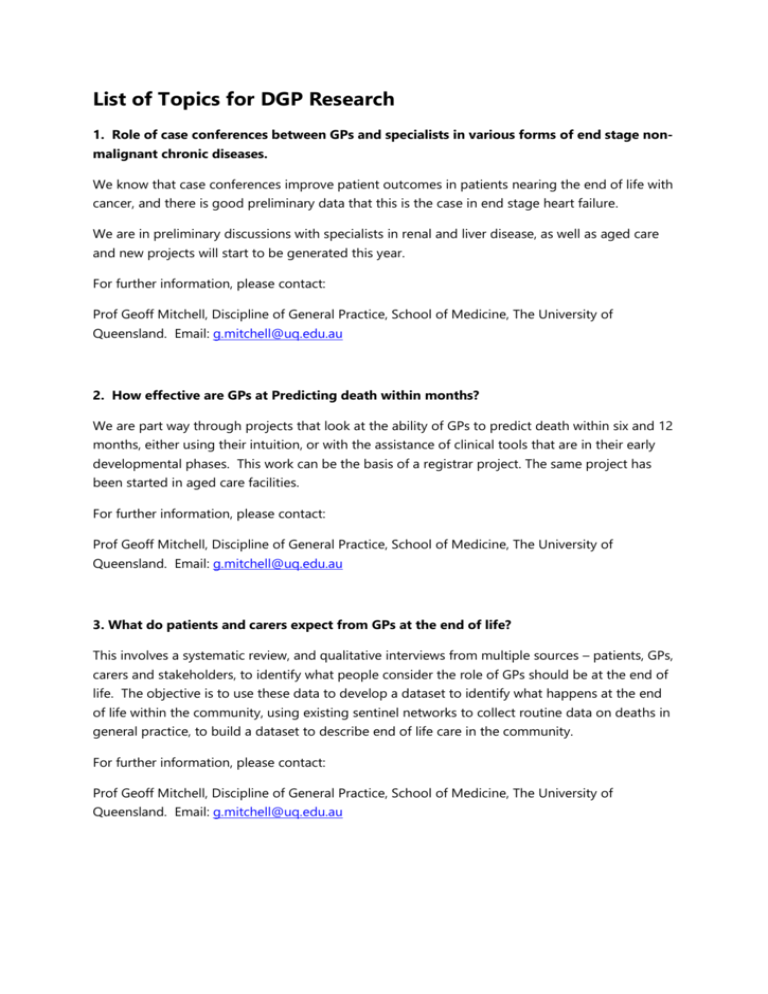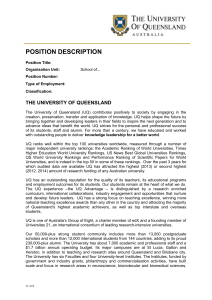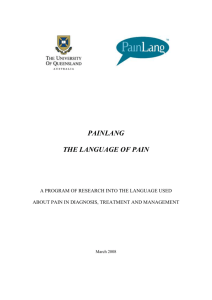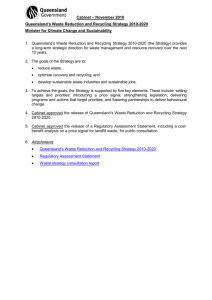List of Topics for DGP Research
advertisement

List of Topics for DGP Research 1. Role of case conferences between GPs and specialists in various forms of end stage nonmalignant chronic diseases. We know that case conferences improve patient outcomes in patients nearing the end of life with cancer, and there is good preliminary data that this is the case in end stage heart failure. We are in preliminary discussions with specialists in renal and liver disease, as well as aged care and new projects will start to be generated this year. For further information, please contact: Prof Geoff Mitchell, Discipline of General Practice, School of Medicine, The University of Queensland. Email: g.mitchell@uq.edu.au 2. How effective are GPs at Predicting death within months? We are part way through projects that look at the ability of GPs to predict death within six and 12 months, either using their intuition, or with the assistance of clinical tools that are in their early developmental phases. This work can be the basis of a registrar project. The same project has been started in aged care facilities. For further information, please contact: Prof Geoff Mitchell, Discipline of General Practice, School of Medicine, The University of Queensland. Email: g.mitchell@uq.edu.au 3. What do patients and carers expect from GPs at the end of life? This involves a systematic review, and qualitative interviews from multiple sources – patients, GPs, carers and stakeholders, to identify what people consider the role of GPs should be at the end of life. The objective is to use these data to develop a dataset to identify what happens at the end of life within the community, using existing sentinel networks to collect routine data on deaths in general practice, to build a dataset to describe end of life care in the community. For further information, please contact: Prof Geoff Mitchell, Discipline of General Practice, School of Medicine, The University of Queensland. Email: g.mitchell@uq.edu.au 4. Understanding Compassion Satisfaction / Fatigue in Primary Health Care Providers. This project seeks to investigate the experience of compassion satisfaction / fatigue in general practice including general practitioners, practice nurses and/or administration staff. For further information, please contact: Dr Margaret Kay, Discipline of General Practice, School of Medicine, The University of Queensland. Email: m.kay1@uq.edu.au 5. Teacher-Learner Partnerships in Longitudinal General Practice Placements: Insights from general practitioners and medical students. Are you considering an academic registrar position and also passionate about teaching and learning? Then consider the following. . . The Discipline of General Practice at The University of Queensland strives to provide high quality, innovative learning experiences for their medical students in the community and general practice settings. A recent initiative has been the Urban LInCC (Longitudinal Integrated Community Care) Project. This project provides opportunities for a selection of 2nd year medical students to spend half a day per week in a general practice, for 13 or 26 weeks per year. The evaluations of this learning experience to date have been extremely positive. We invite an academic registrar with a passion for teaching and learning, to consider sharing involvement with the Urban LInCC team and this exciting project, for their academic registrar research project. With the necessary support and guidance, an academic registrar could undertake a literature review on some aspect of the project (e.g. the role of students in a longitudinal general practice placement, factors promoting successful teacher-learner partnerships, . . . any many more.), assist with the analysis of the teaching and learning evaluations of the participating general practices and students, and take a lead role in the preparation of a manuscript of the findings, for submission to a peer-reviewed journal for publication. For further information, please contact Assoc Prof Marie-Louise Dick, Discipline of General Practice, School of Medicine, The University of Queensland. Email: m.dick@uq.edu.au 6. Patient use of antibiotics when travelling overseas. Background to study Patients often request and GPs often prescribe antibiotics to travellers going to less developed overseas destinations. Little is known about what directions travellers are giving by GPs for guiding when and how to initiate a course of antibiotic treatment, nor for what symptoms and conditions travellers actually take them for. This study was inspired by a NPS brochure on Super Bugs http://www.nps.org.au/health-professionals/health-newsevidence/2014/superbug-stowaways?utm_source=npsdirect&utm_medium=email%20&utm_campaign=2014-2iss16&hq_e=el&hq_m=326322&hq_l=14&hq_v=335d904270 Proposed study Literature review of this area Survey of GPs approach to providing antibiotics for travellers to take with them, and survey or review of records of intending and returned travellers regarding actually usage. Benefit of the research Improving guidance to GPs and patients regarding the provision and usage of antibiotics provided to cover infectious diseases experienced while over travelling overseas. For further information, please contact: Dr David King, Discipline of General Practice, School of Medicine, The University of Queensland. Email: d.king@som.uq.edu.au 7. How is the RACGP multicultural health curriculum delivered in Australian GP training? Methods: Audit of all Australian RTPs delivering GP vocational training through a survey and telephone interviews ( using quantitative and qualitative methods). Outcome: Provide an overview of opportunities and gaps in multicultural health training and recommendations to improve teaching in this increasingly important field of General Practice. For further information, please contact: Dr Rebecca Farley, Discipline of General Practice, School of Medicine, The University of Queensland. Email: r.farley1@uq.edu.au 8. The Evaluation of a Pilot Multi-Disciplinary Student–run Health Promotion Program at the Workplace of Adults with Intellectual Disability (Health and Wellbeing Project). Brief Description: This project will be piloted later this year and will need a formal evaluation. Students from 4 health disciplines (Medicine, Psychology, Dietetics, Exercise Physiology) will prepare and present information at short stations at the Wacol Endeavour Foundation Business Industries workplace. We will collect data from students and participants pre and post. We hope to explore student issues including teamwork, attitudes towards adults with ID, knowledge and skills, as well as health literacy and self-efficacy for adults with ID. Also looking at the benefits of a supportive workplace and brief HP interventions. For further information, please contact: Dr Margo Lane, Discipline of General Practice, School of Medicine, The University of Queensland. Email: m.lane5@uq.edu.au 9. The timeliness and useability of discharge summaries for postpartum women and their infants A recent study we undertook found that only a third of the GPs who responded reported that they nearly always received a discharge summary before they first saw the mother/infant and nearly a quarter never or rarely received a timely discharge summary. Just over half found them somewhat useful, again suggesting that the content and/or layout could be improved. The issue with discharge summaries is compounded by the fact that many women who birth in the public sector are visited by a domiciliary midwife after discharge. No information about this visit is relayed to the GP, either in the discharge summary or by other means. At present there appears to be a large gap between the primary and secondary/tertiary maternity care. Having timely, accurate and useful discharge summaries would improve this situation. This project would include a literature review about the purpose and usefulness of discharge summaries with specific focus on the postpartum period. Information would also be gathered from general practitioners about what they consider important components of a postpartum discharge summary, how they would like to receive it and when. Audits of discharge summaries received in practices may also be undertaken. For further information contact: Associate Professor Wendy Brodribb Discipline of General Practice, The University of Queensland. Email: w.brodribb@uq.edu.au 10. The use of Long Acting Reversible Contraception (LARCs). There has been a recent push for more women to be using LARCs for contraception rather than other forms of contraception, such as the oral contraceptive pill, as a way of reducing the risk of unintended pregnancies. Little is known about any changes in prescribing of LARCS over the past decade and the attitudes of GPs and women about using LARCS – especially the reasons for not choosing a LARC. This project would include a combination of data analysis of prescribing data as well as quantitative/qualitative data collection and analysis of GPs and/or young women. For further information contact: Associate Professor Wendy Brodribb, Discipline of General Practice, The University of Queensland. Email: w.brodribb@uq.edu.au 11 . Development and trialing of a checklist for postpartum care in general practice. Our recent systematic review of guidelines for primary care postpartum care found only one clinical guideline that provided comprehensive recommendations for postpartum care. There is also great variation in the content and timing of postpartum visits. A checklist for what to include in a postpartum visit already exists for infants in their Personal Health Record book, but there is no corresponding checklist for mothers. This project, as part of an ongoing program of research, would involve the development of an evidence-based, best practice checklist for postpartum care, and trialing of the checklist in general practice. It is hoped that a checklist would provide some consistency in the care provided for women and their infants. For further information contact: Associate Professor Wendy Brodribb, Discipline of General Practice, The University of Queensland. Email: w.brodribb@uq.edu.au 12. PPIs in general practice Aim: to explore GP registrars’ prescribing of PPIs (frequency, indication, information needs). Methods: analysis of quantitative data collected in the Registrar Clinical Encounters in Training (ReCEnT) study. The results will be triangulated with data from national Australian medicines call centres and PBS data on prescribed volume. Supervised by Prof and Prof Parker Magin, Dr Simon Morgan For further information contact: Professor Mieke van Driel, Discipline of General Practice, The University of Queensland. Email: m.vandriel@uq.edu.au 13. Choose your own While this list is projects that a GP registrar could run as an academic post, if you have your own topic that you would like to pursue please come and chat to us. This list is just the tip of a big iceberg of expertise. We would welcome any enquiries you may have. Feel free to contact me at b.mitchell@uq.edu.au







